Los Angeles saving money with solar parking meters
 New solar-powered parking meters generated more than $230,000 for the city of Los Angeles in September and are projected to generate $2 to $2.5 million annually for the city, according to a press release distributed by the IPS Group in San Diego.
New solar-powered parking meters generated more than $230,000 for the city of Los Angeles in September and are projected to generate $2 to $2.5 million annually for the city, according to a press release distributed by the IPS Group in San Diego.
“This is the first application of solar panels in parking meters ever,” said Chad Randall, chief operating officer of IPS, the company that builds and installs the meters.
IPS, which specializes in high-tech parking meters, has installed its special patent-pending meters in cities around the country, Randal said. But IPS is the first company to use solar on meters in this way, he said.
“We needed a very robust and long-life battery charging element,” Randall said. “Solar provided that.”
The meters, which accept both coins and credit cards, use wireless technology to run credit cards, allowing people easier ways to pay the meter. The meters also transmit data, statistics and reports wirelessly, Randall said. While they fit into existing meter casing, they use a lot more energy than traditional parking meters that simply take quarters and tick right until the red sign pops up.
Meters typically run on long-lasting batteries, Randall said.
“Battery technology hasn’t really kept up,” he said.
Even with access to energy for regular recharging, he said, standard meter batteries only last about two years.
“Since our meters are like none other,” Randall said, “and they’re very power intensive, we needed to come up with a solution.”
Solar was that solution.
By using small photovoltaic solar panels to consistently recharge the batteries in the meters, IPS has extended the battery life by about 50 percent, Randall said.
The panels are the primary source of energy for the batteries. There are back-up sources in the event something happens to the panels, Randall said, but, for the most part, the meters don’t need anything but the sun to function.
They won’t be hampered much by cloudy or rainy days either, Randall said. The little solar panels will still produce enough power to keep the batteries juiced. The only problems with the technology are extremely shaded areas, he said.
IPS is expanding throughout California and the country with its special high-tech, solar-powered meters.
“We have a lot of momentum right now,” Randall said. “It’s really well-timed in terms of the economy. Cities are looking for new ways to generate revenue, and parking is one of those ways. I also don’t think there’s a city in the country without green initiatives. And we really fall into both of those buckets.”



